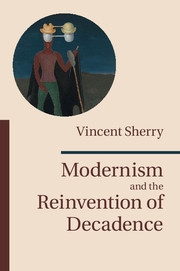Book contents
- Frontmatter
- Dedication
- Contents
- Acknowledgments
- Introduction The Codes of Decadence: Modernism and Its Discontents
- Chapter I The Time of Decadence
- Inter-chapter The Cultivation of Decay and the Prerogatives of Modernism
- Chapter II The Demonstrable Decadence of Modernist Novels
- Inter-chapter Imagism
- Chapter III Ezra Pound: 1906–1920
- Inter-Chapter Reforming Decadence: Late Romanticism, Modernism, and the Politics of Literary History
- Chapter IV T. S. Eliot: 1910–1922
- Afterword Barnes and Beckett, Petropi of the Twilight
- Notes
- Index
Inter-chapter - The Cultivation of Decay and the Prerogatives of Modernism
Published online by Cambridge University Press: 05 October 2014
- Frontmatter
- Dedication
- Contents
- Acknowledgments
- Introduction The Codes of Decadence: Modernism and Its Discontents
- Chapter I The Time of Decadence
- Inter-chapter The Cultivation of Decay and the Prerogatives of Modernism
- Chapter II The Demonstrable Decadence of Modernist Novels
- Inter-chapter Imagism
- Chapter III Ezra Pound: 1906–1920
- Inter-Chapter Reforming Decadence: Late Romanticism, Modernism, and the Politics of Literary History
- Chapter IV T. S. Eliot: 1910–1922
- Afterword Barnes and Beckett, Petropi of the Twilight
- Notes
- Index
Summary
In this inter-chapter, I want to recover a dialect in cultural history that has not found its place in the critical language we have used in representing the tradition of literary modernism. In this language, the ostensibly progressive methods and advanced attitudes of modern art and science are working in the service of an observably antithetical force. It is not primitivism, whose synergy with modernist aesthetics has been well researched. What I am looking at comes instead under a heading that combines the methodologies of modernity and its designated representatives in modernism, which are routinely represented as forward-oriented in outlook and value, with its backward-tracking opposite, which, as it is imagined and conceived, exerts a reverse fascination: in a word, with decadence.
This term claims its use as a reference for the fundamental other of the modern, which is taken mainly as a synonym for advancement narratives, liberation fables, and progress mythologies. “Decadence” expresses not just a condition of being fallen from this increasingly mainstream value, as are the more unwitting representatives of the degeneration disclaimed in moralistic discourses of the later nineteenth century. “Decadence,” instead, represents an enriching debility of loss. It bespeaks an empowering economy of exhaustion, which preoccupies the most developed intelligences as a sometimes unexpected and so troubling but usually emboldening and powerfully attractive discovery. This is a motive interest sufficiently compelling to generate not only the conversation I am recapturing, but the coherence of an intellectual history that is also a cultural memory. It is, ultimately, the form of an artistic consciousness I will present as the sensibility of a profounder modernism. This lost conversation may be reconstituted from a broad resource, and its wider ground might be surveyed at first from above, as it were, in writings by three of its loftiest personages: Nietzsche, Freud, and Poe, who stand respectively in the middle and end and beginning of the history I am following.
- Type
- Chapter
- Information
- Modernism and the Reinvention of Decadence , pp. 88 - 109Publisher: Cambridge University PressPrint publication year: 2014



